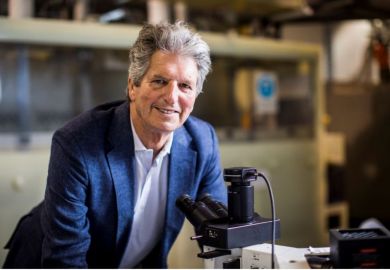Boosting the commercial returns from Australian university research will be the “main goal” of the federal education minister’s tenure and a priority for the government as a whole, an online forum has heard.
Alan Tudge has underlined collaboration with industry and monetisation of research outcomes as his “number one” agenda item. “We want to make a big difference in this space and really shift the dial,” he told the Australian Technology Network (ATN) innovation summit.
In a pre-recorded address, Mr Tudge repeated the messages from his February speech on research commercialisation. He questioned whether the “massive increase” in Australia’s research funding and journal publications had delivered “commensurate impact” for society.
As in February, he cited Cochlear – the ear implant company built on the research of University of Melbourne otolaryngologist Graeme Clark – as a “celebrated” example of commercially successful university research. “That research would not nearly have had the same impact on society, on the world, had it not been commercialised, Mr Tudge said.
“It’s not just commercialisation for the sake of commercialisation. When you do that, you get products out to market and you make a massive difference on people’s lives. We’ve got remarkably good…examples of where great research commercialisation has occurred, but in aggregate, we can do more. We want to do as well as some of the leading countries.”
Submissions on the government’s research commercialisation consultation paper closed on 9 April, with university groups supportive of a new “mission-driven” scheme to incentivise partnerships between business and the sector.
They also supported the government’s proposals for a “stage-gated” process where projects must demonstrate proof-of-concept and commercial promise before becoming eligible for increasingly large pools of funding.
A scoping study for the potential scheme, undertaken by a government-appointed panel headed by businessman Jeff Connolly, is taking the submissions into account. But with the study not expected to be finalised until later this year, it is questionable whether provisions for any new scheme will be included in the May federal budget.
Mr Tudge offered no answers on this or another key question for university administrators. He acknowledged the financial disruption caused by the continuing closure of borders to international students, but said he could provide no “firm guarantees” about their large-scale return. “It still remains my hope that…larger numbers would be back by early next year, but I just can’t guarantee this.”
A 2021 return of students has been predicated on assumptions that the bulk of Australia’s population would be inoculated against Covid-19 by October. This target has now been abandoned amid a slow vaccine roll-out.
And while prime minister Scott Morrison has flagged the possibility of vaccinated Australians being allowed to resume overseas travel, he has vowed not to rush the relaxation of border controls for fear that an influx of foreigners could jeopardise Australia’s success in managing Covid.
Mr Tudge told the ATN summit that he planned “more policy work” on how industry could influence the design of university courses and foster placements for students and graduates.
ATN executive director Luke Sheehy said industry had a role to play in shaping universities’ teaching as well as harnessing their research. “You can’t just add innovation on as a buzzword,” he said. “It has to be enshrined and embedded into what universities do.”
Register to continue
Why register?
- Registration is free and only takes a moment
- Once registered, you can read 3 articles a month
- Sign up for our newsletter
Subscribe
Or subscribe for unlimited access to:
- Unlimited access to news, views, insights & reviews
- Digital editions
- Digital access to THE’s university and college rankings analysis
Already registered or a current subscriber?





